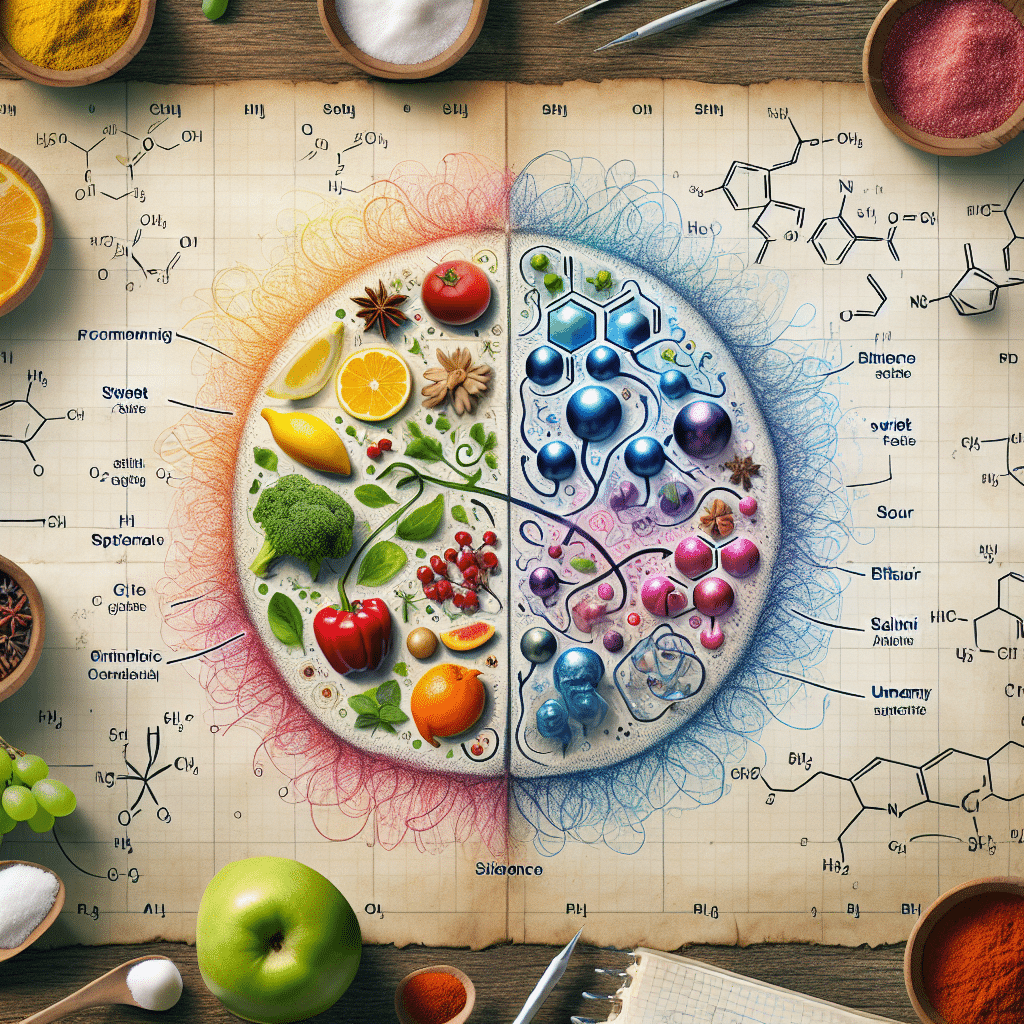Science behind Food Flavoring
-
Table of Contents
- Unlocking the Science Behind Food Flavoring: A Deep Dive
- The Fundamentals of Flavor
- Natural vs. Artificial Flavorings
- Chemistry of Flavor Compounds
- Extraction and Synthesis of Flavors
- Flavor Enhancers and Modifiers
- Regulation and Safety of Flavorings
- Consumer Trends and Preferences
- Conclusion: The Art and Science of Flavor
- Enhance Your Products with ETprotein’s High-Quality Proteins
Unlocking the Science Behind Food Flavoring: A Deep Dive

The world of food is as much about flavor as it is about sustenance. The science behind food flavoring is a fascinating blend of chemistry, biology, and psychology, which together create the tastes and aromas that tantalize our taste buds. In this article, we will explore the intricacies of food flavoring, the role of natural and artificial flavorings, and how they impact our sensory experience.
The Fundamentals of Flavor
Flavor is a multi-sensory experience that is not solely dependent on the sense of taste. It is a combination of taste, smell, and the trigeminal senses that include sensations like cooling from menthol or the burn of chili pepper. The human tongue can detect five basic tastes: sweet, sour, salty, bitter, and umami (savory). However, the majority of what we perceive as flavor comes from the sense of smell.
Natural vs. Artificial Flavorings
Flavorings can be categorized into two main types: natural and artificial. Natural flavorings are derived from plant or animal sources, whereas artificial flavorings are synthesized in a laboratory. Despite the distinction, the chemical makeup of a natural flavor can be identical to its artificial counterpart. The choice between natural and artificial often comes down to cost, availability, and consumer preference.
Chemistry of Flavor Compounds
Flavor compounds are typically volatile molecules that evaporate easily at room temperature, allowing them to travel through the air and reach our olfactory receptors. These compounds can be simple, like the vanillin found in vanilla beans, or complex, like the hundreds of compounds that make up the flavor of a ripe tomato.
- Essential Oils: These are concentrated liquids containing volatile aroma compounds from plants. They are often used in flavoring and perfumery.
- Esters: These are chemical compounds derived from an acid and an alcohol. Many esters have distinctive fruity odors and are used to create fruit flavors.
- Aldehydes and Ketones: These organic compounds contribute to a wide range of flavors, from the almond-like aroma of benzaldehyde to the buttery flavor of diacetyl.
Extraction and Synthesis of Flavors
Natural flavors are extracted from their sources through processes like distillation, expression, or solvent extraction. Artificial flavors, on the other hand, are synthesized by combining various chemicals that are approved for consumption. The creation of flavorings is a precise science, requiring expert knowledge of chemistry and an understanding of how different compounds interact with each other.
Flavor Enhancers and Modifiers
Flavor enhancers, such as monosodium glutamate (MSG), amplify the taste of foods without contributing a distinct flavor of their own. Modifiers, on the other hand, can alter the perception of certain flavors, making them more palatable or masking undesirable notes.
Regulation and Safety of Flavorings
In the United States, the Food and Drug Administration (FDA) regulates flavorings to ensure their safety for consumption. The Flavor and Extract Manufacturers Association (FEMA) also plays a role in evaluating the safety of flavor compounds through its Expert Panel.
Consumer Trends and Preferences
Consumer demand for natural and clean-label products has influenced the flavor industry. There is a growing preference for natural flavorings, despite the higher cost and potential variability in flavor profiles. Additionally, trends such as plant-based diets and global cuisine are shaping the development of new and exotic flavors.
Conclusion: The Art and Science of Flavor
The science behind food flavoring is a complex and ever-evolving field that combines technical expertise with creative artistry. Understanding the chemistry of flavor compounds and how they interact with our sensory system is crucial for creating enjoyable and memorable food experiences. As consumer preferences continue to evolve, the flavor industry will undoubtedly rise to meet the challenge with innovative and delicious solutions.
Enhance Your Products with ETprotein’s High-Quality Proteins
If you’re looking to improve the nutritional profile and flavor of your food products, consider incorporating protein powders from ETprotein. Their extensive range of organic and non-GMO protein products, including rice, pea, and various seed proteins, are characterized by a neutral taste and allergen-free attributes. ETprotein’s L-(+)-Ergothioneine (EGT) offerings also provide a high purity ingredient for various applications in the nutraceutical, pharmaceutical, and food and beverage industries.
About ETprotein:
ETprotein, a reputable protein and L-(+)-Ergothioneine (EGT) Chinese factory manufacturer and supplier, is renowned for producing, stocking, exporting, and delivering the highest quality organic bulk vegan proteins and L-(+)-Ergothioneine. They include Organic rice protein, clear rice protein, pea protein, clear pea protein, watermelon seed protein, pumpkin seed protein, sunflower seed protein, mung bean protein, peanut protein, and L-(+)-Ergothioneine EGT Pharmaceutical grade, L-(+)-Ergothioneine EGT food grade, L-(+)-Ergothioneine EGT cosmetic grade, L-(+)-Ergothioneine EGT reference grade and L-(+)-Ergothioneine EGT standard. Their offerings, characterized by a neutral taste, non-GMO, allergen-free attributes, with L-(+)-Ergothioneine purity over 98%, 99%, cater to a diverse range of industries. They serve nutraceutical, pharmaceutical, cosmeceutical, veterinary, as well as food and beverage finished product distributors, traders, and manufacturers across Europe, USA, Canada, Australia, Thailand, Japan, Korea, Brazil, and Chile, among others.
ETprotein specialization includes exporting and delivering tailor-made protein powder and finished nutritional supplements. Their extensive product range covers sectors like Food and Beverage, Sports Nutrition, Weight Management, Dietary Supplements, Health and Wellness Products, and Infant Formula, ensuring comprehensive solutions to meet all your protein needs.
As a trusted company by leading global food and beverage brands and Fortune 500 companies, ETprotein reinforces China’s reputation in the global arena. For more information or to sample their products, please contact them and email sales(at)ETprotein.com today.












